Launching a startup means hustle.
And that’s hard. The demands are high, the hours long, and the stresses can at times make you feel like you’re about to explode.
So how to entrepreneurs cope with all of those pressures and avoid burnout? We spoke to seven founders and CEOs about their strategies to avoid burnout, especially in the midst of the coronavirus pandemic. Here’s what they said:
Alex Dreiling
Co-founder and CEO, Clipchamp
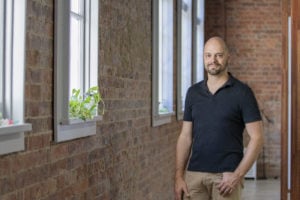
Clipchamp co-founder and CEO Alex Dreiling. Photo: supplied
We have been very fortunate during the whole COVID-19 crisis in that the world needed more solutions like ours. For us, maintaining sanity was therefore less about fearing for the business and more about managing our team and its growth during the crisis.
We have had to learn how to strike a balance between reacting to the changed environment, which happened a lot at the beginning of the crisis, and proactively working towards a new normal that makes sense for us as a company, which started a few weeks into the crisis.
I personally started exercising during the lockdown, every weekday morning for around two hours. This broke up my day really nicely, got me outside, gave me a lot of time to think things through and formed a habit that I don’t want to give up again.
As a family, we also spent more time together, played games, cooked more together and had an opportunity to share more meals, which I really enjoyed.
Alison Hardacre
Co-founder and co-CEO, Halaxy
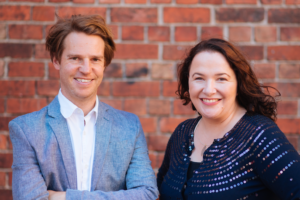
Alison Hardacre, co-CEO of Halaxy, with co-founder Lachlan Wheeler.
There have been many challenging aspects to leading a company during a pandemic, one of which is that in addition to dealing with COVID, all the usual team and growth issues still exist.
Lachie [co-founder and CEO Lachlan Wheeler] and I are leading for the team and we’re managing all the usual issues in a business, such as keeping the team together, communicating the plan, and managing a team and performance — but doing it remotely.
That said, we’re doing it and we’re holding it together. Halaxy is based in Melbourne (currently under a second lockdown), and we’ve been able to learn from what worked and what didn’t during Lockdown 1.0 and make it easier this time round.
Working in healthcare also helps: Lachie and I are motivated by the ultimate goal of making healthcare better; it’s what we signed up for and what we’re good at. But unlike others, we can’t just put work down because (a) we’re founders, and; (b) we’re in healthcare, so when we watch the COVID news it relates to work, and when we work it relates to COVID.
Lachie and I have made sure to check in with the rest of the team, to see how they’re going and to offer our support. Our employees have also called in to check on us, as they understand we’re people too, with our own issues and worries.
It’s a tough time, and I am looking forward to a holiday more than I ever have in my life. Until then, I have my coping strategies such as craft (I’m extending from craft into my first upholstery project) as well as the support and friendships of not only my co-founder but also my team and wider group of friends.
Marko Njavro
Co-founder, FlexCareers
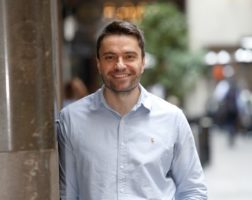
Marko Njavro, co-founder, FlexCareers
When it comes to startup and small business founders, most are feeling the pinch right now. Whether that pinch is financial or mental (or both), keeping a business going as a pandemic rages outside is taking its toll on everyone.
COVID has dealt startups a tough hand: not only are they finding it difficult to raise capital, but in many cases revenue is down, and with no certainty from the government in sight, it’s become impossible to plan for next month, let alone the next two years.
In many ways, we at FlexCareers have been lucky in that we haven’t had to make anyone redundant (including suppliers). This is something that has weighed — and continues to weigh — heavily on my mind: that I am directly responsible for the livelihoods of 11 permanent employees and their families, as well as many more contractors and service providers.
These are people I know, respect and like. Unlike in a big corporation, my co-founder and FlexCareers CEO, Joel McInnes, and I know every single person who works for us and that magnifies (and personalises) every decision we make.
It’s undeniably stressful, and Joel — who has three daughters — has had to tag team with his wife (who also has a prominent role) to ensure both can do their jobs. It’s added more work and stress to both of us, but that’s just the current reality.
All we can do is support each other and our team, and keep working as best as we can under extremely difficult circumstances.
Ben Leeds
Country Manager, Perkbox Australia
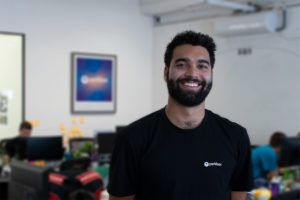
Ben Leeds, Perkbox Australia country manager.
I personally experienced burnout in 2018 after leading a hugely intense, hugely complex project that dominated almost every waking moment of my life for around 8 months.
After we (very successfully) finished the project, burnout hit me like a freight train – I was unable to focus on anything, unable to shake this feeling of tiredness and unable to enjoy a lot of aspects of my life.
It took around nine gruelling months to recover, but it left me with a lot of valuable personal insight into how to manage myself, and how to avoid burning out again.
Being upfront about burnout is crucial. There shouldn’t be a stigma about it, people can’t always be at their peak performance. Being honest about your own experiences is a good way to show your team that they’re in a safe environment where they can share their emotions and struggles in a constructive way.
You also need to be proactive and actively think about your team’s health and their ability to take on new projects without putting them at risk. It’s important to spot burnout early and come up with a decisive plan to address it.
Managers may hate to admit it, as it can set the entire team back, but sometimes the solution is just time away from work to reset. I don’t think founders should be afraid to give time back to their team during this period. It could be as simple as a long weekend — taking the Friday off — every so often. It just gives staff that extra reason to keep pushing on.
Ultimately, it’s difficult to navigate staff motivation at the best of times, let alone during a pandemic. Do your best, but also realise that every manager in Australia is currently facing the same issues and that there are no clear cut rules for managing burnout.

Sam Pratt, CEO, Render
Sam Pratt
CEO, Render
Even with the best measures in place, I think burnout will strike a lot of organisations this year. The pace many organisations are operating at during this pandemic is unsustainable, and I think we’re already starting to see it slow. It’s nothing a good team paddle-board or axe throwing session wouldn’t fix. But the challenge for managers is that the pandemic makes the usual tactics of raising morale difficult.
For many, work is the only aspect of their life that is progressing forward right now.
It’s a small thing, but it is incredibly important for employees to feel as if their work has direction, meaning and purpose at the moment. With startups, that involves clearly articulating your vision for change and promoting and celebrating those milestones — however you can — when you hit them.
Michelle Gallaher
CEO, Opyl
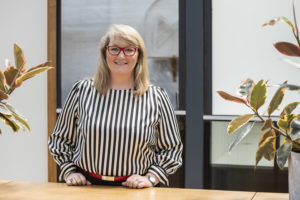
Opyl CEO Michelle Gallaher
Last year I did the Thrive Global Program by Arianna Huffington, and met the great lady herself. ‘Micro-steps’ was my big learning from Arianna; these are the small, positive changes that lead to bigger, more concrete change.
My challenge is living and breathing social media, and looking at it as soon as I wake – before I’m even out of the bedroom sometimes.
My other big challenge is poor hydration. So my micro-step is one glass of water as soon as I wake, and making that the priority over social media or emails.
Another micro-step is drinking a big glass of water as soon as I get up.
After that, I try to meditate for three to five minutes (not successfully most mornings, but I’m a work in progress). Note: I only try for three minutes or so – a micro-step. Then I make coffee, and then I look at social media.
The water habit has really paid off over the past six months. I’m drinking three to four times what I was drinking this time last year, my skin is looking great, and I think I manage my weight better too. Micro-steps are the opposite of big promises. It’s about little bites, forming small, strong habits that are then easier to extend.
The other strategy we have as a team is to start each meeting by saying two words about how we feel. It gives us a read on each others’ mood, while also encouraging respect and connectedness. It was a little bit clunky the first two times we did it, but at every group meeting we check-in now.
The other day, I said I was feeling ‘optimistic’ and ‘clean’ (I had just washed my hair), yesterday I was ‘strong’ and ‘yellow’.
We usually say a few more words to qualify the chosen word, but sometimes we don’t. I said ‘yellow’ because it’s a happy colour and my cousins favourite (and it was her birthday that day). So they don’t have to be obvious mood-related words, but can be quite esoteric and quirky.
As long as others understand the relative meaning of your chosen words, it works well.
As a business, we have just signed up to a digital platform called Connect Psych, led by a brilliant female CEO and founder, Dr Natalie Flatt.
The platform gives my team on-demand access to matched psychologists from the privacy of their own home, remote location or office, as it’s all delivered via telehealth. Every contact is confidential, and employees can access mental health support as they need it without having to go to HR or get any permissions.
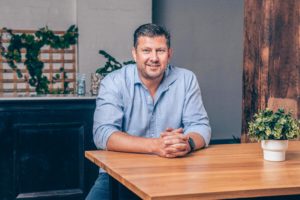
Ben Thompson, CEO, Employment Hero
Ben Thompson
Co-founder and CEO, Employment Hero
My best advice for dealing with burnout is maintaining a strong friendship group, particularly with peers who can empathise with what you’re going through as a business leader.
I have been a member of the Young Presidents’ Organisation and the Entrepreneurs’ Organisation for over 20 years, and the relationships I’ve made through these groups are invaluable.
If you’re in the position to do so, I encourage you to give to others. It doesn’t have to be monetary, you could offer your time or expertise, but the benefits you feel when helping other people are so great that it almost feels selfish.
Finally, prioritise your health. Try to do 30 minutes of cardio every day – I find ocean swimming and bushwalking to be incredibly restorative and calming. Mindfulness is a fantastic stress reliever too.
I discovered meditation when my parents took me trekking in Nepal at age nine; now, I use Sam Harris’ Waking Up app almost every day.
One element of meditation is practising gratitude – a gratitude journal works wonders, although I have to admit this is something I find hard to maintain.
- If you feel like you need some help and/or someone to talk to, get in touch with Beyond Blue on 1300 22 4636 or you can chat online between 3pm and midnight daily here.




















Trending
Daily startup news and insights, delivered to your inbox.